Jun. 11, 2020
Summary
- To ascertain the impacts of the spread of Covid-19 on consumer behavior of Japanese citizens, in continuation of the survey it conducted in March 2020, Nomura Research Institute (NRI) conducted an emergency internet survey of roughly 3,000 Japanese respondents in May 2020. (For an overview of the survey, refer to Reference: Survey Overview below.)
- With people being asked to stay at home and feeling uneasy about an uncertain road ahead, the life satisfaction level of Japanese citizens markedly decreased in May. However, people with a high level of life satisfaction even under such conditions were people who, by utilizing internet services and applications, were benefiting from digital lives that enhanced convenience and enabled them to enjoy their spare time.
- People with a high level of life satisfaction were those who were aware of the conditions for teleworking, were more self-directed and digitally actively, and had a high level of “digital pliability.” People with a high level of “digital pliability” positively used information for personal purposes, and brought significant benefits of the facilitation of the use of information to the state and businesses. To facilitate digitalization for all citizens, it will become even more necessary to provide support to families who do not have an internet environment and provide digital education assistance.
The life satisfaction of Japanese citizens has declined in general because of the Covid-19 crisis
To ascertain the impacts of the spread of Covid-19 on the actions
and psychological state of consumers, Nomura Research Institute
(NRI) conducted an emergency survey of 3,000 Japanese respondents in
mid-March 2020 and in the beginning of May. (Note: For the results
of the March survey, refer to
https://www.nri.com/en/keyword/proposal/20200331.) Because
of the issuance of a declaration of a state of emergency
for the entire country in April, NRI was able to investigate
differences between before and after the declaration of a state of
emergency.
In the long-continuing stay-at-home lifestyle, there has been a
downward trend in the degree of life satisfaction of Japanese
respondents. NRI conducted continuous surveys on the level of
satisfaction of people with respect to their daily lives, using the
four stages of “satisfied,” “somewhat satisfied,” “not very
satisfied,” and “not satisfied”; when the results of the surveys
that were conducted in January, March, and then this May are
compared, there were no changes in trends in satisfaction levels
from January to March, but from March to May, the number of people
satisfied with their lives declined (“satisfied” (-2%), “somewhat
satisfied” (-11%)), and the number of people not satisfied increased
(“not very satisfied” (+5%), and “not satisfied” (+9%)) (Fig. 1).
Because of the spread of Covid-19, since early March, schools have
been closed and people have shown a tendency to abstain from leaving
their homes and meeting with other people. Then in April, a
declaration of a state of emergency was issued, stores etc. were
forced to close, and with “stay home” as the key word, people were
forced to be in a quarantine mode during Golden Week, something that
was unprecedented. In addition to concerns about matters such as
their health, income and employment, uneasiness about an uncertain
road ahead, and the stay-at-home lifestyle continuing for a long
period, a decline in the level of life satisfaction was probably
unavoidable. With respect to the sense of unease and impacts on
consumer behavior, refer to the separate article titled “Impacts of
the Spread of Covid-19 on Japanese Consumer Behavior (2)” (https://www.nri.com/jp/keyword/proposal/20200526_2).
As mentioned in the above proposal, even though there was a downward
trend in the level of life satisfaction, about half of the survey
subjects responded that they were satisfied with their current
lives. This article will present the results of further
investigations regarding the types of people with a high level of
life satisfaction even during their current stay-at-home lifestyle.
Between people who were satisfied with their lives and people who were dissatisfied with their lives, there were differences in how they used the internet
As discussed in another NRI proposal titled “Acceleration of
Digitalization: Several Years’ Worth of Progress Made in the Last
Two Months ” (https://www.nri.com/jp/keyword/proposal/20200527), the
number of hours of internet use increased because of the of
the stay-at-home lifestyle and an increase in the amount of time
spent at home; however, after analyzing the number of television
viewing hours and the number of internet use hours by the level of
life satisfaction in the May survey, it became clear that the number
of hours of internet use were long for both people with a high level
of satisfaction and those with a low level of satisfaction (Fig.
2).
At first glance, it appears that there is no relationship between
Internet use and the levels of life satisfaction. However, persons
who were satisfied and persons who were dissatisfied differed in how
they used the Internet. People who were satisfied and persons who
were dissatisfied with their lives both had a high number of video
viewing hours on the Internet, but people with a high level of life
satisfaction tended to use the Internet for shopping, banking, and
other services for their convenience while minimizing outings, or to
communicate with others. On the other hand, among NRI’s survey
items, the only item that was higher for people who were
dissatisfied with their lives than those who were satisfied with
their lives was “social games (free).” Looking at these results, is
seems that people who were dissatisfied with their lives only used
the internet for aimless net surfing, instead of using the Internet
for specific purposes.
Although people with a low level of life satisfaction had a high sense of uneasiness, the uneasiness did not lead to action
As discussed in the proposal mentioned above, the uneasiness and
concerns of Japanese citizens consisted not only of anxiety toward a
contagious disease and uneasiness regarding the health of their
family members, but also a growing anxiety regarding their jobs and
becoming unemployed, and such tendencies were higher with people who
were dissatisfied with their lives. However, such uneasiness did not
necessarily lead to any action on their part.
Among the items that people would like to consume less going
forward, there was a high tendency among people who were satisfied
with their lives to hold off consumption related to travel and
outings, and in contrast, there was a high tendency among people who
were not satisfied with their lives to hold off consumption related
to food and beverages etc., which can be said to be daily essentials
(Fig. 3). People who were dissatisfied with their lives worried
about various things, but their attitude about taking precautions
against Covid-19 and their attitude toward finding fulfillment from
their restricted stay-at-home lifestyles may have been lower than
those of persons who were satisfied with their lives.
People with high levels of life satisfaction enjoyed their digital lives even with their stay-at-home lifestyle
Perhaps people who are satisfied with their lives use the latest
internet services and applications to enhance the level of their
life satisfaction. For example, the higher the level of one’s life
satisfaction, the more likely one was to actually use and to desire
to use Amazon Teiki Otoku Bin and other “regular delivery services
for the purchase of consumables.” Further, the actual amount of use
and the intent to use regarding Mercari and other flea market
applications were high among people who were satisfied with their
lives. Even when shopping for daily essentials and other items was
necessary, an environment where internet services can be used was
helpful for consumers to shop while staying at home (Fig. 4).
Further, with regard to video and music transmission subscription
services such as Amazon Prime, Spotify, DAZN, Kindle Unlimited, and
smart speakers such as Amazon Alexa, Google Assistant, and Line
Clova, the actual amount of use and intent to use were also high
among people who were satisfied with their lives, and they were
active in endeavoring to enjoy their free time and making their
lives more convenient during stay-at-home periods by linking such
services with other services (Fig. 5).
People with a high level of life satisfaction even during their
restricted stay-at-home lifestyle can be said to be people who, by
wisely using internet services and applications, are taking
advantage of their digital lives to enhance convenience and to enjoy
their free time.
“Digital Pliability” sense of value under the new normal
Because of the Covid-19 crisis, people who were satisfied with their
lives were also beginning to change their views about their lives
going forward. For example, there has been a significant push in
promoting teleworking after the declaration of a state of emergency,
and among people who think that “there’s a growing sense that work
can be done to some extent without going to the office, and
workstyles in Japan will change significantly going forward,” there
were many with a high level of life satisfaction (Fig. 6). In the
past, jobs were premised on working at set times and at set places,
and it can be said that people who work under such restrictions from
the time they graduate from school until the time for mandatory
retirement are workers who are flexible in terms of organization,
but going forward, views on flexibility are likely to change. For
the past few years, work-life balance has become more valued and
there has been a demand for promotion of “work-style reform,” and
the fact that teleworking is becoming more common because of the
Covid-19 crisis means that workers will be freed from time and space
constraints. With more flexibility in terms of the time and place
for work, it will become necessary for individual workers to be
self-directed and actively use digital tools for communication etc.
with company organizations; thus, having “digital pliability” will
become more important going forward.
Further, especially among people who felt strongly that “at times of
large-scale disasters or other emergencies such as a pandemic, it is
unavoidable that the state will place additional restrictions on the
private movements or work activities of the population,” there were
many who were satisfied with their lives (Fig. 7). There were many
people who were satisfied with their lives who felt that use of
personal information is permissible for the sake of convenience or
other benefits, and because they used the Internet wisely and
benefited from such use, they did not mind having their personal
information used during the Covid-19 crisis or other emergency, or
if there were any benefits from such use. Such people have high
“digital pliability,” Heightening digital pliability in such a way
will not only make the lives of people more fulfilling, but will
also be extremely beneficial to the state and businesses in terms of
facilitating the use of information. To facilitate digitalization
for all citizens, it will become even more necessary to provide
support to families who do not have an internet environment and
provide digital education assistance.
[Reference] Survey Overview
|
■Survey name |
Investigations on the Effects of the Spread of Covid-19 Infection on Lifestyle |
|
■Survey period |
March 2020, May 2020 |
|
■Survey method |
Internet survey |
|
■Survey subjects |
Men and women aged 15-69 across the country |
|
■Number of valid responses |
3,098 people (March), 3,945 people (May) |
|
■Main survey items |
|
|
◇Information gathering behavior |
…Ways of gathering information, and any changes thereto |
|
◇Communication |
…Attitudes towards parent-child relationships, marital relationships, local relationships |
|
◇Work style |
…Work conditions, work attitude |
|
◇Consumer values |
…Attitudes toward consumption, areas where subjects actively want to spend their money going forward |
|
◇Actual consumer activity |
…Inclination to dine out, use delivery or online services etc., and any changes thereto |
|
◇Overall lifestyle, life planning |
…Economic/income prospects, any uneasiness or worries currently faced |
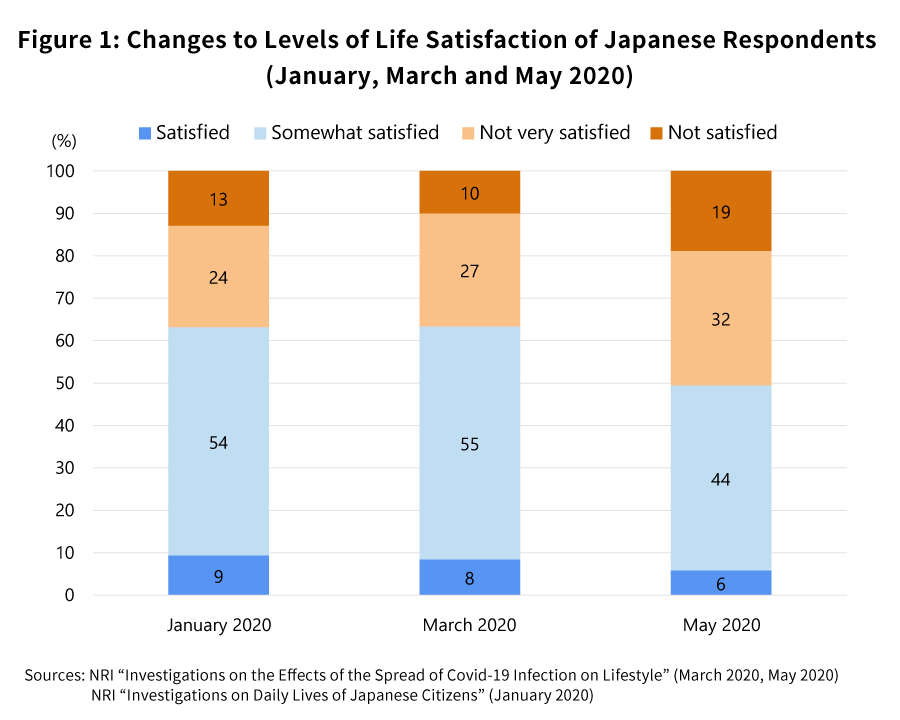
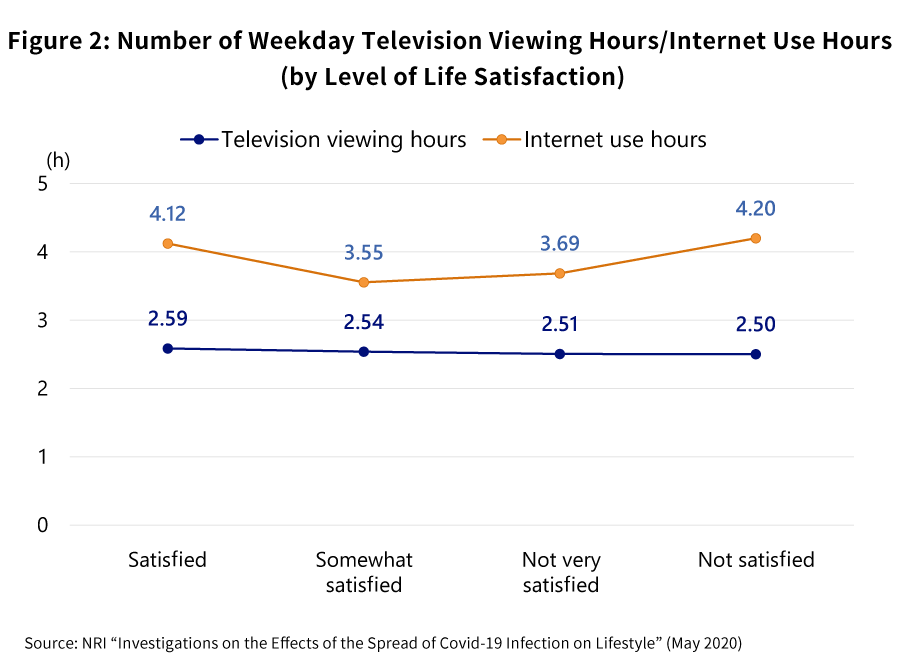
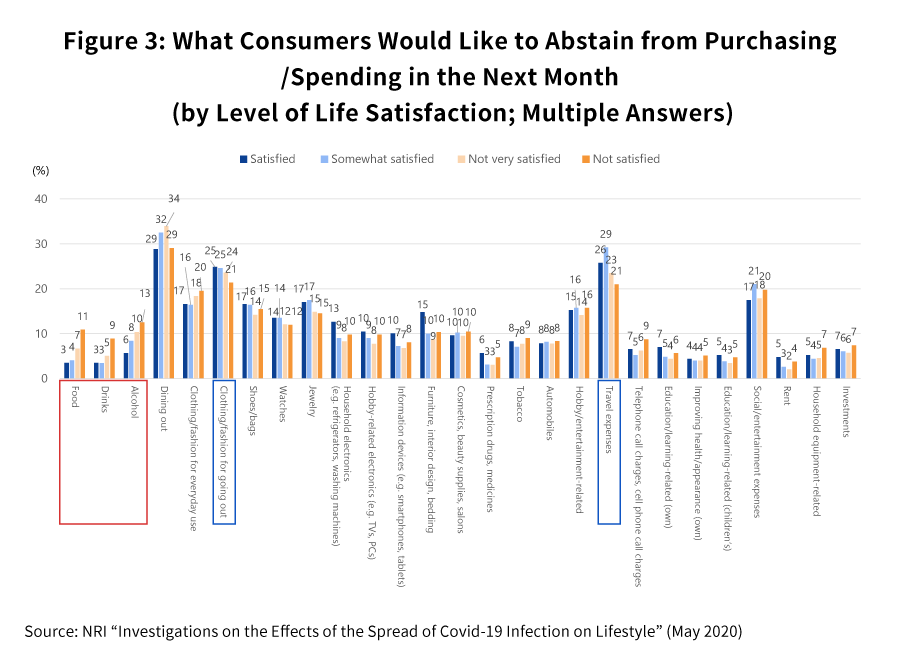
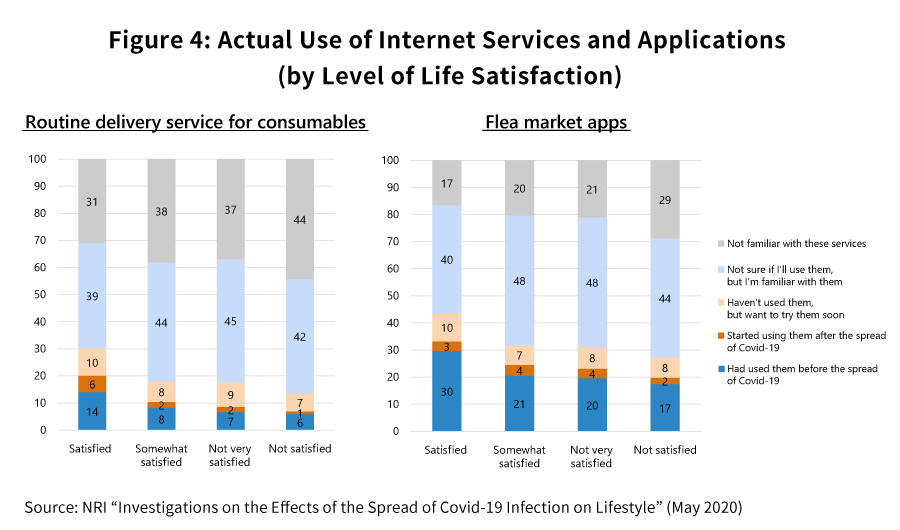
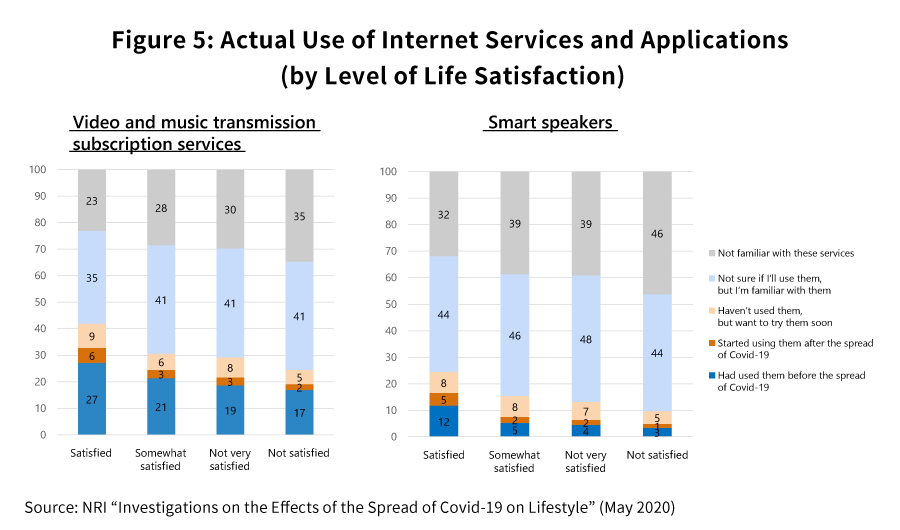
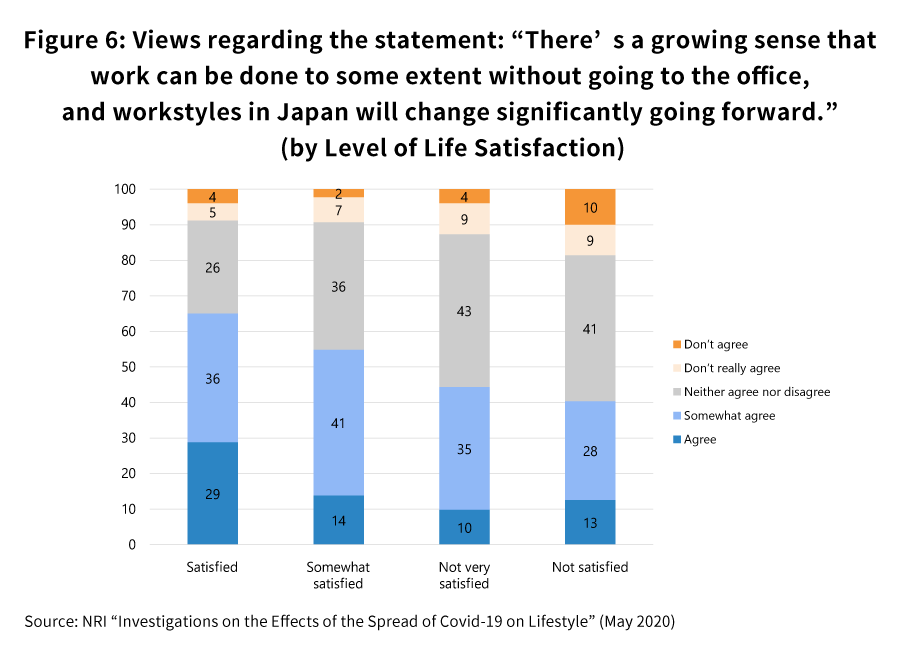
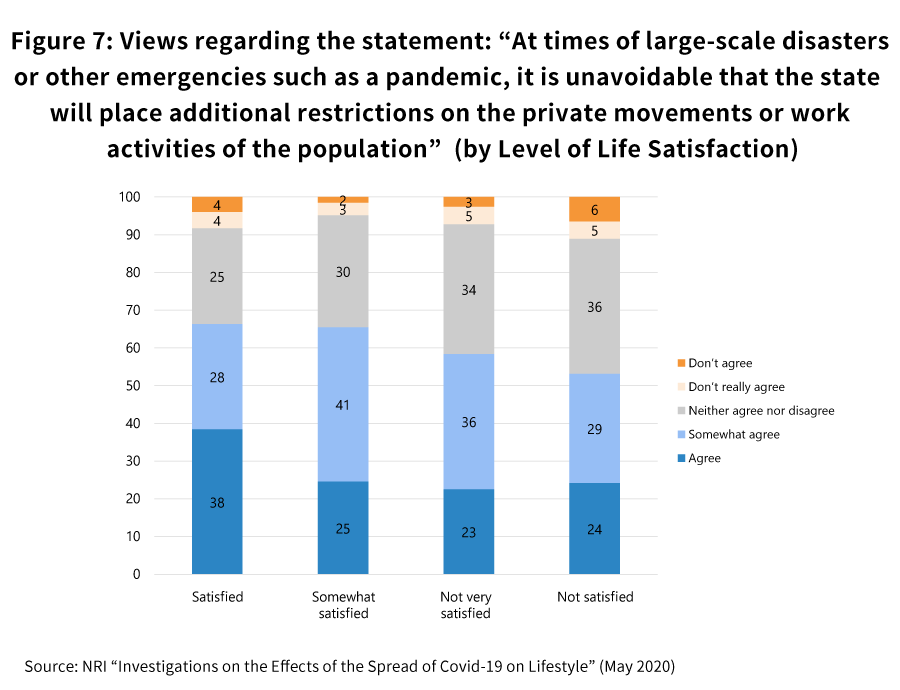
Author
Hiroyuki Hayashi
Marketing Science Consulting Department
Nomura Research Institute
Contact Us
Media Inquiries:
-
Corporate Communication Department
Nomura Research Institute, Ltd.
TEL: +81-3-5877-7100
Inquiries about the proposals:
-
Center for Strategic Management & Innovation
Nomura Research Institute, Ltd.